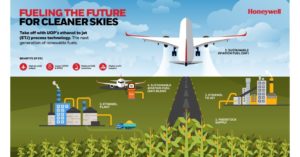 Honeywell has announced an innovative ethanol-to-jet fuel (ETJ) processing technology that allows producers to convert corn-based, cellulosic, or sugar-based ethanol into sustainable aviation fuel (SAF).
Honeywell has announced an innovative ethanol-to-jet fuel (ETJ) processing technology that allows producers to convert corn-based, cellulosic, or sugar-based ethanol into sustainable aviation fuel (SAF).
Demand for SAF continues to grow, yet the aviation industry is challenged by limited supplies of traditional SAF feedstocks such as vegetable oils, animal fats and waste oils. Ethanol offers producers a widely available, economically viable feedstock. Honeywell’s ready now technology uses high-performance catalysts and heat management capabilities to maximize production efficiency, resulting in a cost-effective, lower carbon intensity aviation fuel.
A 2021 life-cycle analysis by the U.S. Department of Energy’s (DOE) Argonne National Laboratory concluded that ethanol-to-jet fuel conversion, combined with other technologies such as carbon capture and sequestration (CCUS) and smart farming practices, can result in negative GHG emissions compared to petroleum-based jet fuel.
“Honeywell pioneered SAF production with its Ecofining™ technology, and our new ethanol-to-jet fuel process builds on that original innovation to support the global aviation sector’s efforts to reduce GHG emissions and meet SAF production targets with an abundant feedstock like ethanol,” said Barry Glickman, vice president and general manager, Honeywell Sustainable Technology Solutions. “Honeywell’s ethanol- to-jet process, when used as a standalone or when coupled with Honeywell carbon capture technology, is ready now to provide a pathway to lower carbon-intensity SAF.”

